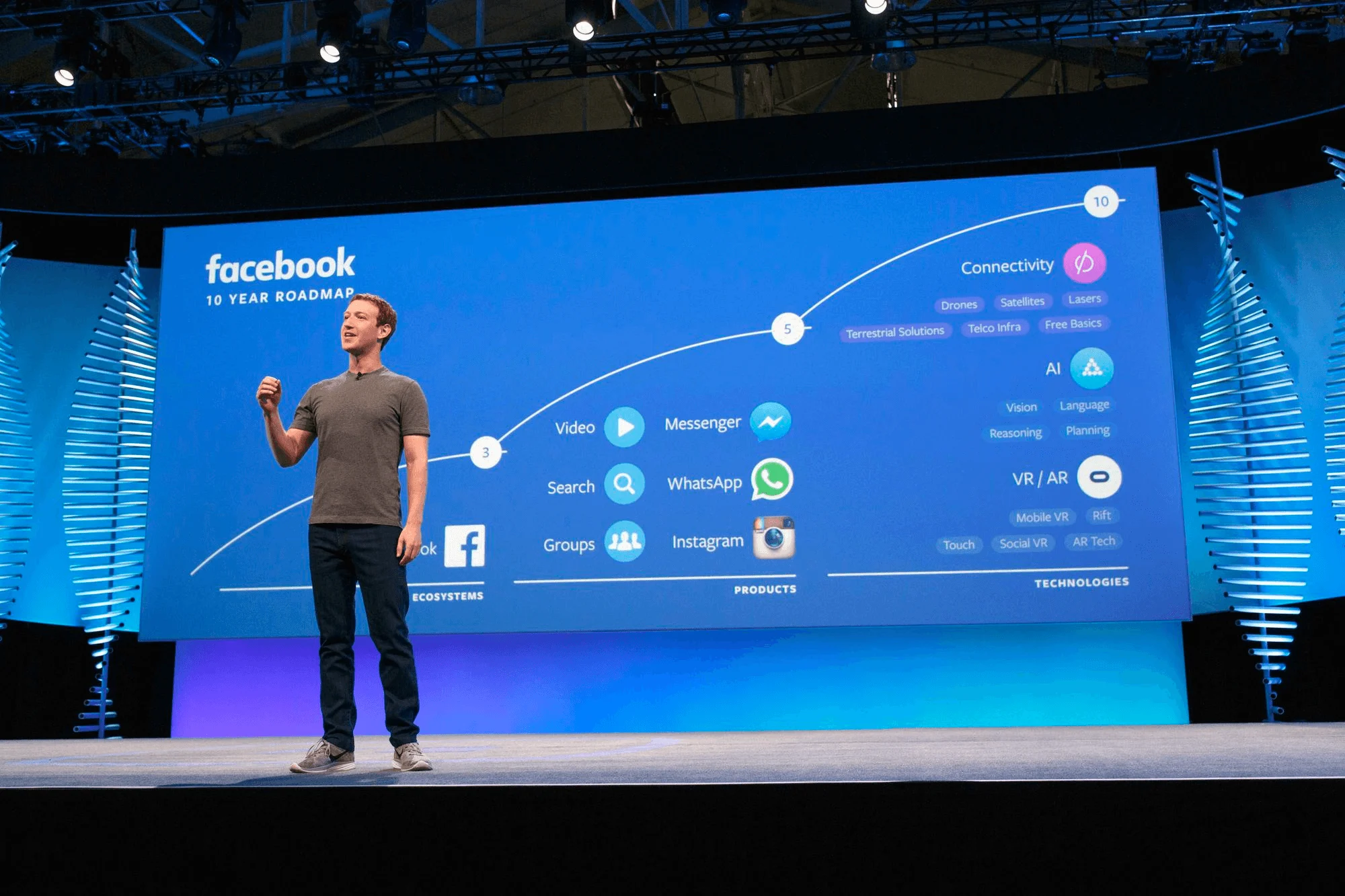A rebrand is not enough to distract from Facebook’s mountain of scandals
By Rhys Wright
25 November 2021

By Rhys Wright
25 November 2021

The widely derided decision to rename Facebook’s parent company from Facebook, Inc. to Meta Platforms, Inc. has come at a crucial juncture for the social media juggernaut. The past few months have seen Facebook, a controversy magnet for much of its existence, beset by a tidal wave of bad publicity ranging from a worldwide outage, to a slew of damning allegations from whistle-blower Frances Haugen. That is not to say this long-planned renaming is purely an exercise in public relations, but its conspicuous timing raises questions over just how damaged the Facebook brand has become, and more importantly, just how much damage Facebook has arguably wrought on all of us.
To comprehend the sheer scale to which Meta and its platforms Facebook, Instagram, and WhatsApp have penetrated societies around the world you have to look at the numbers. In the third quarter of 2021 Facebook had a reported average of 1.93 billion daily active users and during the same period grossed 28.276 billion in advertising revenue (more than the entire GDP of Cyprus). Similarly, Instagram surpassed 1 billion monthly users last year and WhatsApp claims to have over 2 billion users. The sheer quantity of messages sent, photos, videos, and articles shared per second is mindboggling, and all of it flows through one company’s servers, which contain the personal data of literally billions of people.

It has been widely acknowledged for years now that this vast web of connectivity has culminated in endless social problems, with perhaps the most dangerous to the average individual being the adverse effects of social media usage on mental health. The expectation to post picture-perfect photos devoid of physical flaws can encourage body surveillance and body dissatisfaction, which is only aggravated by comparing yourself negatively to others, by comments on your appearance, and a growing preoccupation with engagement metrics such as friends, followers, likes, and comments.
This is by no means exclusive to Facebook and Instagram, but it is nevertheless a problem that has defined a generation. A study in The American Economic Review found that 80% of participants who deactivated Facebook responded that deactivation was good for their subjective well-being. So, if the prolonged use of Facebook and all of the potential doomscrolling, envy, and toxic communities is widely perceived as bad for mental health, why has Facebook’s quantity of daily active users continued to rise year on year for over a decade?
Aside from growing internet access in developing countries, part of the reason is that Facebook is a nightmare for any long-time user to quit. The main Facebook app is a minefield of addiction where every like received could give you a dopamine hit: its every feature is designed to keep people using it. The more time people spend on Facebook, the more the company earns in ad revenue. But let us say you have managed to wean yourself off of the main Facebook app, surely then you can just delete your account and be all the better for it, right? Well, that is where the interconnectedness of Facebook’s services and its gargantuan userbase complicate things. In short, no matter how miserable Facebook makes you, for many people, deleting their account is too inconvenient a sacrifice.
Facebook’s very connectivity is what keeps you shackled to it. In my own experience, despite rarely using the main Facebook app, there is always something that necessitates coming back to it just when I consider taking the plunge and deleting my account. At every school and university I have been to, Facebook and Instagram have always been the primary points of virtual contact for friends and acquaintances, so deleting my account would mean losing contact with dozens of people. Group chats, group pages, events organised via Facebook, logging off would cut off access to all of that. And as for full-blown account deletion, years’ worth of photos, videos, memories, and contacts would disappear.
Where a single platform has come to penetrate so deeply into so many people’s lives, problems are bound to occur, but the most sinister part is that concerns over the privacy of individual Facebook users’ data have had real-world consequences. Privacy concerns have dogged Facebook almost since its inception but never has the company broken the trust of its users quite so spectacularly as in the Cambridge Analytica scandal.
In 2010, Facebook launched Open Graph, a platform allowing third-party apps to request the personal data of Facebook users which also allowed the harvest of data from all of an individual user’s Facebook friends. The consulting firm Cambridge Analytica used this data (from an estimated 87 million profiles) to create psychological profiles of Facebook users which were used to tailor political ads for their clients, including the 2016 presidential campaigns of Ted Cruz and Donald Trump. All of the personal data collected—age, gender, sexuality, political views, address, religion, absolutely anything available from a harvested account—was used to create ads specifically designed to appeal to an individual and sway them for or against a certain candidate.
The political response to the scandal prompted Mark Zuckerberg to take out full-page ads in major newspapers across the UK and US apologising, and the American Federal Trade Commission slapped Facebook with a $5 billion fine, the largest it has ever levied against a technology company. However, $5 billion is a drop in the ocean for Facebook. During the third quarter of 2019 when this fine was announced, Facebook reported earning $17.383 billion in advertising revenue, a figure their latest quarterly earnings surpass by over $10 billion. Similarly, the reputational damage has done nothing to stop their average daily active users rising each year, so if one of the most damaging privacy scandals in the company’s history and the full might of the Federal Trade Commission have done nothing to hinder the platform’s growth, how can we ever hold Meta accountable if similar misconduct happens again?
This is a question that rears its head every time Facebook is back in the headlines and one it is still difficult to find an effective solution to. Simply deleting your Facebook account does not necessarily mean you will be divesting from Meta entirely: anyone using Instagram, WhatsApp or any of Meta’s other brands is also contributing to Meta’s revenue, even if you are not directly paying them. Meta’s habit of buying out potential competition like Instagram and WhatsApp has meant the company is no longer defined by Facebook, but this alarming vertical integration makes it harder for consumers to hold the company accountable for its offences. If the social cost of cutting out Facebook or Instagram is too inconvenient then people will be less inclined to do so, meaning the one power consumers have to force Meta to listen, depriving them of patronage, is one many people will never bother exercising no matter how much they disapprove of Meta’s actions.
The closest the company has come to a major crisis since the Cambridge Analytica scandal is the ongoing saga of whistle-blower Frances Haugen. Haugen, a former Facebook employee, has released thousands of internal documents that, if genuine, are a damning indictment of the company’s leadership. The documents show many distressing things, among them internal research concluding that Instagram usage aggravates mental health difficulties, particularly among teenage girls. Haugen’s documents also suggest that Facebook has largely failed at curtailing misinformation. Perhaps the most pervasive damage wrought by Facebook and its ineffective process for handling misinformation is that the platform has facilitated the spread of harmful extremism around the world, from the Rohingya genocide in Myanmar to the Islamophobic conspiracy theory ‘Love Jihad’ in India. In an age where misinformation has the potential to harm and wreak enormous social damage, more needs to be done on the part of Meta to stop the spread of misinformation and extremism on their platforms.

Interestingly, despite the company’s revenue and daily active users remaining high in the face of scandal after scandal, the documents released by Haugen also suggest that the amount of 18–24-year-olds using Facebook daily has been in decline since 2012-13. Meanwhile, Instagram is still vastly popular among 18–34-year-olds, but this may change over time as under 18s tend to prefer TikTok. This is bad news for a company that makes most of its revenue through selling advertising space, whose business model depends on more engagement to earn more ad revenue. Facebook’s concern over this decline at least offers some hope that more people divesting from the platform could force them to make much-needed reforms.
Haugen, while speaking to MPs last month, suggested that external regulation is the only way to effect meaningful change in Facebook. This approach does have the potential to force Meta to make the changes it refuses to make internally while Mark Zuckerberg maintains his controlling 51% stake in the company. Just recently, a lobby group representing major French news outlets successfully reached an agreement with Facebook that would mean the company will have to pay for news shared on its platform.
The timing of Facebook, Inc.’s rebranding as Meta amid the PR maelstrom of Haugen’s revelations has done nothing but draw further attention to the crisis. Even if the purpose of the renaming was to reposition the focus of the company towards the “metaverse”, the fact that they would so willingly trade in a name known around the world for something that sounds like a fictional parody of a nefarious tech company speaks volumes as to just how corrosive the Facebook brand has become. And yet, if their latest ad revenue is anything to go by, it won’t matter. Even if this latest “metaverse” venture turns out to be nothing more than a $10 billion boondoggle, Meta still has deep pockets. Even if Haugen’s revelations and any future scandal drag the company’s reputation closer to rock bottom, it likely would not impact their ad revenue at all. How did one company become so unaccountable that there is no crime too big to sink it? Because we all did nothing to stop it. But now, it’s long past time to log off.
Written by
Rhys WrightStudent and writer engrossed by books, film, and theatre. Always interested in learning more about the world, culture, politics, people, and places.
Weekly emails
Get more from Rhys
The Fledger was born out of a deep-seated belief in the power of young voices. Get relevant views on topics you care about direct to your inbox each week.
Write at The Fledger
Disagree with Rhys?
Have an article in mind? The Fledger is open to voices from all backgrounds. Get in touch and give your words flight.
Write the Contrast